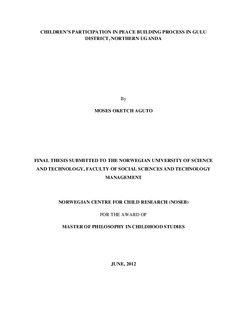| dc.contributor.advisor | Abebe, Tatek | nb_NO |
| dc.contributor.author | Aguto, Moses Oketch | nb_NO |
| dc.date.accessioned | 2014-12-19T14:37:26Z | |
| dc.date.available | 2014-12-19T14:37:26Z | |
| dc.date.created | 2012-10-11 | nb_NO |
| dc.date.issued | 2012 | nb_NO |
| dc.identifier | 560042 | nb_NO |
| dc.identifier.uri | http://hdl.handle.net/11250/269047 | |
| dc.description.abstract | This thesis is concerned with the experiences of children who were formerly abducted and recruited into armed rebellion by the Lord’s resistance Army (LRA) in Northern Uganda. It discusses their experience of participating in peace building process and the challenges they face in the community. The thesis further highlight the role of a local NGO – Gulu Support the Children Organization (GUSCO) in resettling and reintegrating ex-child soldiers into community life backed by the fact that recently both local and international NGOs have increased and invested a lot of effort and resources in conflict zones to promote peace.
The theories that guided this study were the social studies of childhood and related perspectives that explain children’s experience in conflict. These are children’s agency and victimcy, resilience, lost generation, traditional and transitional justice theories. These theories have been explained in detail regarding how they help to analyze the perspectives and experience of children in armed conflict and peace building.
The study is a qualitative one, and several methods were used in the process of data collection such as individual interviews, focus group discussion, and observation and field notes taking. The informants in this study were mainly ex-child soldiers who attended GUSCO and they were 15 in number with 6 girls and 9 boys.
The findings of the research revealed that initially children take part in war, and negotiate their ways out of it, while contributing immensely in peace-building process and the task of integration into society. Although children in the context of war are seen as mere victims, this research highlights the complex and dynamic ways in which they negotiate agency and actively contribute to the peace building process and reintegration activity underway in the region. In their involvement in the GUSCO, they get several support such as immediate psychosocial support, material basic needs and medical care, vocational training as well as family tracing. The children face challenges such as health problems, marginalization and stigma by community members, corruption where the services intended for them are diverted, inability to locate family members and poor counseling services at both school and local levels. The study goes further to show that the efforts to represent and assist children who come of age in war-torn communities like one I studied cannot or should not take place without understanding the wider economic, geo-political and cultural context that help to enhance or constrain the peace building process. | nb_NO |
| dc.language | eng | nb_NO |
| dc.publisher | Norges teknisk-naturvitenskapelige universitet, Fakultet for samfunnsvitenskap og teknologiledelse, Norsk senter for barneforskning | nb_NO |
| dc.subject | Social and Behavioural Science, Law | en_GB |
| dc.title | Children's Participation in Peace Building Process in Gulu District, Northern Uganda | nb_NO |
| dc.type | Master thesis | nb_NO |
| dc.contributor.department | Norges teknisk-naturvitenskapelige universitet, Fakultet for samfunnsvitenskap og teknologiledelse, Norsk senter for barneforskning | nb_NO |
